|
Past EMI Fellows
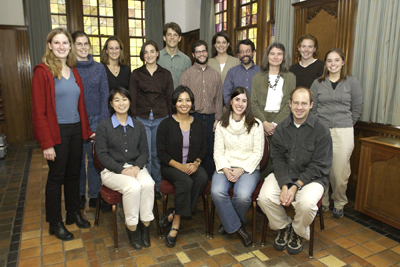
Amanda Barker
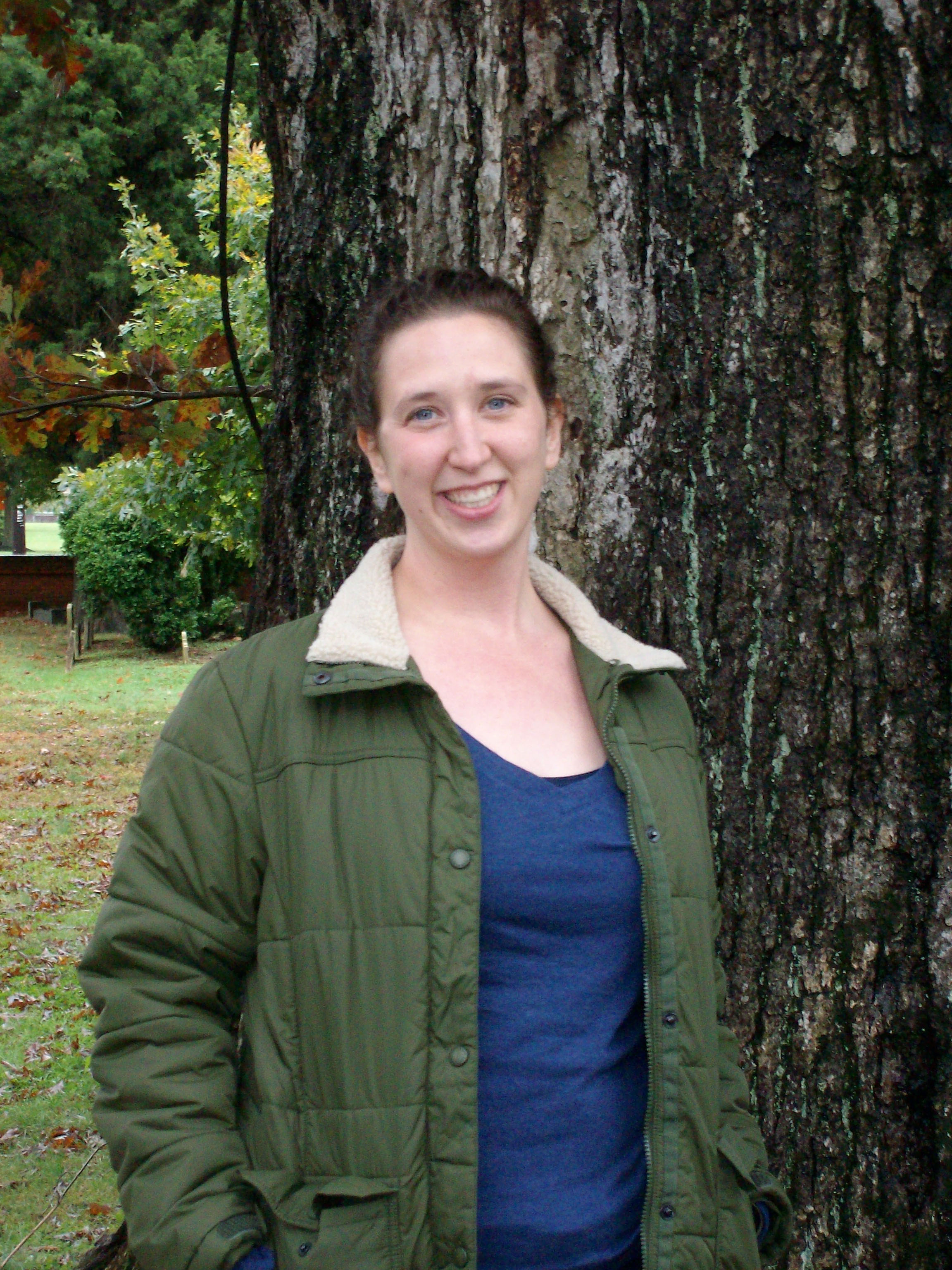 Amanda is a first-year M.S. student at the University of Michigan’s School of Natural Resources and the Environment (SNRE), specializing in Environmental Policy and Planning. She received her B.A. in Earth and Planetary Sciences from Washington University in St. Louis in 2004. After, she was a Grants Coordinator for the Biology Department at Georgia State University. From 2005-2008, Amanda served in Peace Corps Madagascar as a Parks and Agriculture Volunteer. She worked extensively with a community park to promote transparent management practices, as well as develop community projects with a local farmers association, including permaculture and SRI (Système de Riz Intensification). She also worked with the Andrew Lees Trust in Fianarantsoa, Madagascar, producing educational radio programming throughout Southern Madagascar with solar powered radios and listening groups. Amanda’s interest in sustainable public and community land management brought her to work with the Ecosystems Management Initiative. Amanda is a first-year M.S. student at the University of Michigan’s School of Natural Resources and the Environment (SNRE), specializing in Environmental Policy and Planning. She received her B.A. in Earth and Planetary Sciences from Washington University in St. Louis in 2004. After, she was a Grants Coordinator for the Biology Department at Georgia State University. From 2005-2008, Amanda served in Peace Corps Madagascar as a Parks and Agriculture Volunteer. She worked extensively with a community park to promote transparent management practices, as well as develop community projects with a local farmers association, including permaculture and SRI (Système de Riz Intensification). She also worked with the Andrew Lees Trust in Fianarantsoa, Madagascar, producing educational radio programming throughout Southern Madagascar with solar powered radios and listening groups. Amanda’s interest in sustainable public and community land management brought her to work with the Ecosystems Management Initiative.
Ria Berns
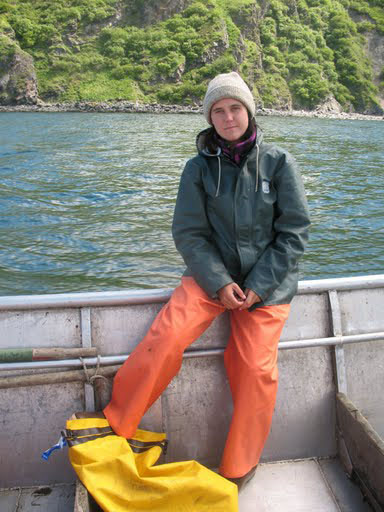 Ria Berns is a first-year dual degreestudent pursuingan M.S. in Environmental Policy and Planning at the School of Natural Resources and Environment and an M.P.P. at the Gerald R. Ford School of Public Policy. Before arriving in Michigan, Ria worked as anenvironmental policy consultant in Seattle where she advised state and federal environmental agencies on a range of issues including, lean and green manufacturing, clean diesel initiatives, Great Lakes water quality, and climate change strategy. Growing up in Washington (State) and Alaska imparted upon Ria a love of wilderness and salt water. Her primary policy interests center around these issues, specifically ocean and water policy, and climate change adaptation. Ria received a B.A. in Political Science from Williams College in 2004. Ria Berns is a first-year dual degreestudent pursuingan M.S. in Environmental Policy and Planning at the School of Natural Resources and Environment and an M.P.P. at the Gerald R. Ford School of Public Policy. Before arriving in Michigan, Ria worked as anenvironmental policy consultant in Seattle where she advised state and federal environmental agencies on a range of issues including, lean and green manufacturing, clean diesel initiatives, Great Lakes water quality, and climate change strategy. Growing up in Washington (State) and Alaska imparted upon Ria a love of wilderness and salt water. Her primary policy interests center around these issues, specifically ocean and water policy, and climate change adaptation. Ria received a B.A. in Political Science from Williams College in 2004.
Clayton Elliott
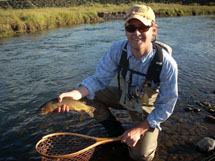 Clayton, a fourth generation Wyomingite, grew up on the eastern slope of the Greater YellowstoneEcosystem and spent his youth exploring, riding, and fishing some of the last wild placesinourcountry. He attended his state’s only university, the University of Wyoming, receiving degrees inEconomics and Environment and Natural Resources in 2008. While at the University of Michigan,Clayton is focusing his study on public land policy and natural resource conflict in the Intermountain West. His master’s thesis explores the integration of mule deer management into the federal agency planning processes with regard to oil and gas leasing on the West’s public lands. Over the past summer Clayton interned with the Theodore Roosevelt Conservation Partnership working on these issues. After graduation, Clayton looks forward to returning to the open spaces and rural communities of Wyoming. He anticipates working for anadvocacy organization,mobilizing communities and hunting and fishing interests in protecting Wyoming’s wild landscapes and unique cultural heritage with contemporary pressures of development. Clayton, a fourth generation Wyomingite, grew up on the eastern slope of the Greater YellowstoneEcosystem and spent his youth exploring, riding, and fishing some of the last wild placesinourcountry. He attended his state’s only university, the University of Wyoming, receiving degrees inEconomics and Environment and Natural Resources in 2008. While at the University of Michigan,Clayton is focusing his study on public land policy and natural resource conflict in the Intermountain West. His master’s thesis explores the integration of mule deer management into the federal agency planning processes with regard to oil and gas leasing on the West’s public lands. Over the past summer Clayton interned with the Theodore Roosevelt Conservation Partnership working on these issues. After graduation, Clayton looks forward to returning to the open spaces and rural communities of Wyoming. He anticipates working for anadvocacy organization,mobilizing communities and hunting and fishing interests in protecting Wyoming’s wild landscapes and unique cultural heritage with contemporary pressures of development.
Michael Fainter
Michael Fainter is a Ph.D. student in the School of Natural Resources and Environment. He earned a Master’s in Environmental Planning at UC Berkeley and a Master’s in English at Virginia Tech. For several years, he worked as an environmental scientist for the CALFED Bay-Delta Program—a large, interdisciplinary, multi-agency, stakeholder-intensive process designed to restore the San Francisco Bay-Delta watershed while enhancing Bay-Delta water supplies. After leaving federal service, he joined a private science firm as a restoration planner, where he developed and implemented scientific studies and restoration plans for several California rivers and streams. He is experienced in designing restoration and research projects at several spatial scales, while incorporating ecosystem-based management and adaptive management into the project design. Michael’s research focuses on ecosystem-based management of fisheries and water resources.
Jason Good
Jason Good graduated from Longwood University with a B.S. in biology. After college, Jason worked in a variety of positions, from engineer to lab assistant to legal assistant. However, it was his most recent position, working as a fisheries observer in the groundfish fisheries off the coast of Oregon , Washington and in Alaska 's Bering Sea , that instilled in Jason the importance of environmental conflict management and collaboration. After three years of counting fish and managing environmental conflict one boat at a time, Jason began a master's degree program at the School of Natural Resources and Environment with a concentration in resource policy and behavior. Jason is interested in how the process of collaboration can be used to overcome environmental conflict and to further innovative approaches to conservation. Jason's thesis examines the influence of the Federal Advisory Committee Act on collaboration, with a focus on the Bureau of Land Management.
Matt Griffis
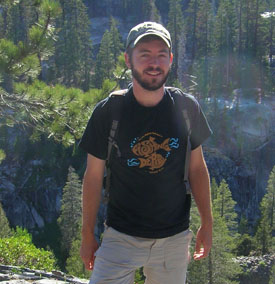 Matt is interested in public land planning and management, specifically in regards to protected areas. His research is focused on the siting of solar energy facilities in the California desert. He also completed an internship with the National Park Service at Golden Gate National Recreation Area, where he developed the park's ocean stewardship plan. Before graduate school, Matt was an outdoor skills instructor for the East Bay Regional Park District in Oakland, California. He has also worked for the U.S. Fish and Wildlife Service and as a trail crew foreman and backpacking guide in northern New Mexico. Matt holds a BS in environmental sciences from the University of California, Berkeley. Matt is interested in public land planning and management, specifically in regards to protected areas. His research is focused on the siting of solar energy facilities in the California desert. He also completed an internship with the National Park Service at Golden Gate National Recreation Area, where he developed the park's ocean stewardship plan. Before graduate school, Matt was an outdoor skills instructor for the East Bay Regional Park District in Oakland, California. He has also worked for the U.S. Fish and Wildlife Service and as a trail crew foreman and backpacking guide in northern New Mexico. Matt holds a BS in environmental sciences from the University of California, Berkeley.
Colin Hume
Originally from Seattle, Washington, Colin grew up hiking in the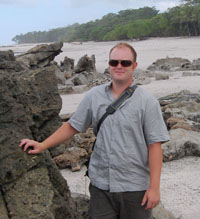 mountains and forests of the western U.S., developing a love for wild places. After earning a B.S. in Biology from Western Washington University, he spent several years working on wildlife surveys for the USDA Forest Service in Montana and California, and working for a NGO in Afghanistan. Additionally, Colin served as the Assistant Director for Snowboarding at Big Sky Resort, in Big Sky, Montana. Colin continues to focus on the conservation potential of both public and private lands, through development of best use and management practices in his Masters studies. Colin is part of a team of graduate researchers investigating marine ecosystem-based management initiatives throughout the world. During the summer of 2009 he worked for the Huron River Watershed Council as a coordinator of their Bioreserve program, leading teams of volunteers on environmental assessments of natural areas throughout the watershed. mountains and forests of the western U.S., developing a love for wild places. After earning a B.S. in Biology from Western Washington University, he spent several years working on wildlife surveys for the USDA Forest Service in Montana and California, and working for a NGO in Afghanistan. Additionally, Colin served as the Assistant Director for Snowboarding at Big Sky Resort, in Big Sky, Montana. Colin continues to focus on the conservation potential of both public and private lands, through development of best use and management practices in his Masters studies. Colin is part of a team of graduate researchers investigating marine ecosystem-based management initiatives throughout the world. During the summer of 2009 he worked for the Huron River Watershed Council as a coordinator of their Bioreserve program, leading teams of volunteers on environmental assessments of natural areas throughout the watershed.
Jennifer Lee Johnson
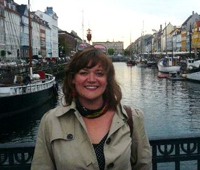 Jennifer is a Ph.D student in the School of Natural Resources and Environment. She employs interdisciplinary theory and methodology from anthropology, political ecology, history and fisheries science to analyze the interconnections between ecological and socio-economic, political and cultural change in the Lake Victoria Basin in East Africa. Jennifer also conducts case study research on marine ecosystem-based management in the Wadden Sea in Northern Europe, the West Coast of the United States, the North American Great Lakes and on the East Coast of Africa. Prior to beginning her graduate studies, Jennifer studied International Political Economy at the Colorado College and worked for the Marine Fish Conservation Network in Washington, DC. While obtaining her M.S., Jennifer worked for the National Oceanic and Atmospheric Administration’s Great Lakes Environmental Research Lab and the Blue Ocean Institute. Jennifer is the founder and co-host of “It’s Hot in Here” on 88.3 WCBN-FM-Ann Arbor, plays rock’n’roll cello with the Collective Moans, and tries to enjoy Michigan’s four seasons to the fullest. Jennifer is a Ph.D student in the School of Natural Resources and Environment. She employs interdisciplinary theory and methodology from anthropology, political ecology, history and fisheries science to analyze the interconnections between ecological and socio-economic, political and cultural change in the Lake Victoria Basin in East Africa. Jennifer also conducts case study research on marine ecosystem-based management in the Wadden Sea in Northern Europe, the West Coast of the United States, the North American Great Lakes and on the East Coast of Africa. Prior to beginning her graduate studies, Jennifer studied International Political Economy at the Colorado College and worked for the Marine Fish Conservation Network in Washington, DC. While obtaining her M.S., Jennifer worked for the National Oceanic and Atmospheric Administration’s Great Lakes Environmental Research Lab and the Blue Ocean Institute. Jennifer is the founder and co-host of “It’s Hot in Here” on 88.3 WCBN-FM-Ann Arbor, plays rock’n’roll cello with the Collective Moans, and tries to enjoy Michigan’s four seasons to the fullest.
Amy Samples
Amy is studying landscape management with attention to water resources at the 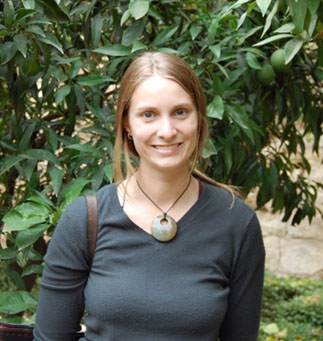 University of Michigan’s School of Natural Resources and Environment. She earned a Bachelor of Science in Environmental and Natural Resources with a concentration in Economic Policy from Clemson University in 2004. She has worked at Shenandoah National Park, in support of Bandhavgarh National Park in India, and as an Outdoor Educator in New England. While working for The Nature Conservancy’s Chesapeake Bay Initiative she became familiar with the logistics of large scale conservation and project coordination. Based on her interest in watershed functionality, Amy’s master’s research focuses on the interface between terrestrial ecosystem management decisions and freshwater ecological response. Other research experiences include the development of conservation measures for the Green River project in Kentucky, marine ecosystem based management, and regulatory response to the impact of wet weather events on water quality. University of Michigan’s School of Natural Resources and Environment. She earned a Bachelor of Science in Environmental and Natural Resources with a concentration in Economic Policy from Clemson University in 2004. She has worked at Shenandoah National Park, in support of Bandhavgarh National Park in India, and as an Outdoor Educator in New England. While working for The Nature Conservancy’s Chesapeake Bay Initiative she became familiar with the logistics of large scale conservation and project coordination. Based on her interest in watershed functionality, Amy’s master’s research focuses on the interface between terrestrial ecosystem management decisions and freshwater ecological response. Other research experiences include the development of conservation measures for the Green River project in Kentucky, marine ecosystem based management, and regulatory response to the impact of wet weather events on water quality.
Sarah Tomsky
Sarah has an unusual background, having received her B.F.A. in Photography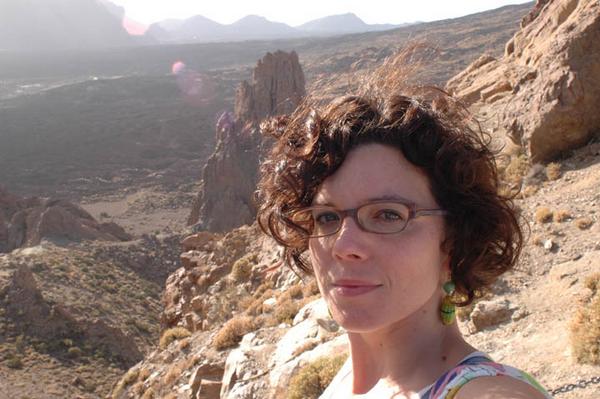 and Art History from Washington University in St. Louis in 1998. After several years working in the art world, she transitioned to the travel industry. Her professional experience afforded opportunities to travel to some of the world’s most remote and beautiful places, including the Peruvian Amazon and the South Shetland Islands of Antarctica. Travel inspired her to make a change in profession, and she returned to grad school to pursue a career in natural resources. Sarah is pursuing a Masters of Science at the University of Michigan’s School of Natural Resources and Environment, focusing on Environmental Policy and Planning, and Conservation Biology. She is particularly interested in public lands policy and conservation planning. Her master’s research focuses on the potential ecological impacts of siting utility-scale solar facilities on public land in the California Desert. Additional experience includes marine ecosystem based management and renewable energy policy. and Art History from Washington University in St. Louis in 1998. After several years working in the art world, she transitioned to the travel industry. Her professional experience afforded opportunities to travel to some of the world’s most remote and beautiful places, including the Peruvian Amazon and the South Shetland Islands of Antarctica. Travel inspired her to make a change in profession, and she returned to grad school to pursue a career in natural resources. Sarah is pursuing a Masters of Science at the University of Michigan’s School of Natural Resources and Environment, focusing on Environmental Policy and Planning, and Conservation Biology. She is particularly interested in public lands policy and conservation planning. Her master’s research focuses on the potential ecological impacts of siting utility-scale solar facilities on public land in the California Desert. Additional experience includes marine ecosystem based management and renewable energy policy.
Mary Adelzadeh
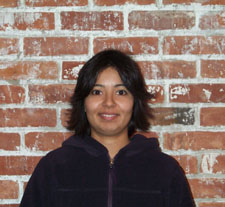 Mary Adelzadeh is a native of northern Arizona. Mary's Navajo upbringing and strong interest in the environment led her to pursue a B.S. in Environmental Biology and Management from the University of California, Davis. Immediately after graduation, Mary began work in the non-profit sector, first, with the federal Bureau of Land Management as a training coordinator for team-taught workshops on community-based collaborative resource management and community volunteerism. The workshops focused on improving intergroup relations, civic engagement, and collaboration among resource-dependent communities, environmentalists, and public land managers throughout the West. More recently, Mary worked as a community organizer for an environmental and social justice organization in Nevada, where she focused on bringing federal land management agencies, private mining interests, and Native Americans together to shape government policy regarding the impact of mining on ancestral Indian lands and sacred sites. Mary's commitment to conservation brought her to the School of Natural Resources and Environment at the University of Michigan to pursue a Master's degree in Resource Policy and Behavior, with an emphasis on collaboration and conflict management. Mary's career goal is to help restore ecosystems while preserving Native American values and customs associated with the land. She hopes to achieve this by facilitating collaboration between Native American communities and government agencies charged with managing public lands, and through the reintegration of traditional ecological knowledge in land management practices. Mary Adelzadeh is a native of northern Arizona. Mary's Navajo upbringing and strong interest in the environment led her to pursue a B.S. in Environmental Biology and Management from the University of California, Davis. Immediately after graduation, Mary began work in the non-profit sector, first, with the federal Bureau of Land Management as a training coordinator for team-taught workshops on community-based collaborative resource management and community volunteerism. The workshops focused on improving intergroup relations, civic engagement, and collaboration among resource-dependent communities, environmentalists, and public land managers throughout the West. More recently, Mary worked as a community organizer for an environmental and social justice organization in Nevada, where she focused on bringing federal land management agencies, private mining interests, and Native Americans together to shape government policy regarding the impact of mining on ancestral Indian lands and sacred sites. Mary's commitment to conservation brought her to the School of Natural Resources and Environment at the University of Michigan to pursue a Master's degree in Resource Policy and Behavior, with an emphasis on collaboration and conflict management. Mary's career goal is to help restore ecosystems while preserving Native American values and customs associated with the land. She hopes to achieve this by facilitating collaboration between Native American communities and government agencies charged with managing public lands, and through the reintegration of traditional ecological knowledge in land management practices.
Adam Block
 Originally from Baltimore, Maryland, Adam graduated from the University of New Hampshire in 2001 with a B.S. in Environmental Conservation. In the fall of 1999 Adam spent a semester at the Arava Institute for Environmental Studies in southern Israel studying sustainable and organic desert agriculture and coral reef ecology. After college he worked for a small municipal land-use consulting firm in southern New Hampshire. His work focused primarily on preparing conservation plans, master plan revisions, and zoning ordinance amendments, and providing general planning assistance for a number of towns. A conservation plan he helped author for the Town of Newmarket, NH is responsible for protecting hundreds of acres of land since its adoption and implementation by the Town in early 2002. As a first year Masters student in the School of Natural Resources and Environment, Adam's current academic interests lie in exploring and developing ways to proactively engage communities in land conservation and in evaluating the success of conservation programs in meeting their stated goals. He is also interested in identifying and/or creating opportunities to further land conservation within existing local, state, and national policy structures. Originally from Baltimore, Maryland, Adam graduated from the University of New Hampshire in 2001 with a B.S. in Environmental Conservation. In the fall of 1999 Adam spent a semester at the Arava Institute for Environmental Studies in southern Israel studying sustainable and organic desert agriculture and coral reef ecology. After college he worked for a small municipal land-use consulting firm in southern New Hampshire. His work focused primarily on preparing conservation plans, master plan revisions, and zoning ordinance amendments, and providing general planning assistance for a number of towns. A conservation plan he helped author for the Town of Newmarket, NH is responsible for protecting hundreds of acres of land since its adoption and implementation by the Town in early 2002. As a first year Masters student in the School of Natural Resources and Environment, Adam's current academic interests lie in exploring and developing ways to proactively engage communities in land conservation and in evaluating the success of conservation programs in meeting their stated goals. He is also interested in identifying and/or creating opportunities to further land conservation within existing local, state, and national policy structures.
Dave Chadwick
 Originally from South Dakota, Dave Chadwick graduated from Pomona College with a BA in Politics in 1995. After college, he spent three and a half years in Washington, DC, on the staff of Senator Dianne Feinstein (D-California). During that time, he did everything from answering mail to advising the Senator on a range of environmental and agricultural issues. His background also includes work for a nonpartisan policy research group in Minneapolis, Minnesota, and a season of stream surveying for the US Forest Service in northwest Colorado. While living in Minnesota, Dave was an active volunteer with the Minnesota Land Trust and at a local wildlife refuge. Dave is a first-year Master's student in the Resource Policy and Behavior program at the School of Natural Resources and Environment, focusing on public land policy, land conservation, and citizen involvement in resource management. As a research associate with EMI, Dave is helping investigate state-based ecosystem management Originally from South Dakota, Dave Chadwick graduated from Pomona College with a BA in Politics in 1995. After college, he spent three and a half years in Washington, DC, on the staff of Senator Dianne Feinstein (D-California). During that time, he did everything from answering mail to advising the Senator on a range of environmental and agricultural issues. His background also includes work for a nonpartisan policy research group in Minneapolis, Minnesota, and a season of stream surveying for the US Forest Service in northwest Colorado. While living in Minnesota, Dave was an active volunteer with the Minnesota Land Trust and at a local wildlife refuge. Dave is a first-year Master's student in the Resource Policy and Behavior program at the School of Natural Resources and Environment, focusing on public land policy, land conservation, and citizen involvement in resource management. As a research associate with EMI, Dave is helping investigate state-based ecosystem management
Anne Finken
 Anne Finken is a second-year student pursuing an M.S. in Natural Resource Policy and Behavior at the School of Natural Resources and Environment and a J.D. at the University of Michigan Law School. Anne is originally from Iowa City, Iowa and graduated from Goucher College with a B.A. in Chemistry in 1999. After college, Anne researched habitat restoration programs initiated by the U.S. Army Corps of Engineers and water quality monitoring efforts in the Upper Mississippi River Basin as an intern at American Rivers in Washington D.C. After interning, she worked for a consulting firm where she primarily provided environmental regulatory support. This included analysis and review of air regulations at the federal, state, and local level as well as data analysis and calculation related to air emissions. Anne has also taught high school chemistry in the D.C. Metro area. At EMI, Anne is investigating how collaborative resource organizations track their accomplishments over time and how they evaluate their progress towards achieving established goals. Anne Finken is a second-year student pursuing an M.S. in Natural Resource Policy and Behavior at the School of Natural Resources and Environment and a J.D. at the University of Michigan Law School. Anne is originally from Iowa City, Iowa and graduated from Goucher College with a B.A. in Chemistry in 1999. After college, Anne researched habitat restoration programs initiated by the U.S. Army Corps of Engineers and water quality monitoring efforts in the Upper Mississippi River Basin as an intern at American Rivers in Washington D.C. After interning, she worked for a consulting firm where she primarily provided environmental regulatory support. This included analysis and review of air regulations at the federal, state, and local level as well as data analysis and calculation related to air emissions. Anne has also taught high school chemistry in the D.C. Metro area. At EMI, Anne is investigating how collaborative resource organizations track their accomplishments over time and how they evaluate their progress towards achieving established goals.
Elizabeth Hamilton
 Liz Hamilton is a first-year student pursuing an M.S. in Natural Resource Policy and Behavior at the School of Natural Resources and Environment and an M.B.A. at the University of Michigan Business School. Before coming to Michigan, Liz spent three years working as part of The Nature Conservancy's national science team. Liz led a study that measured the impacts of a $6 million dollar Ecosystem Research Program. She also worked on organizational analyses involving the future of coastal and marine conservation and opportunities for using social science tools in conservation. Before that, she helped write toxicological profiles of hazardous substances for a health and environmental consulting company. Liz received a B.A. in Biology from Cornell University in 1998, and she spent a wonderful semester studying rainforest, marine, and Aboriginal cultural ecology in Queensland, Australia, through the School for International Training in 1997. Liz is broadly interested in developing human communities that effectively balance ecological and social considerations and in applying the suite of scientific and political strategies for biodiversity conservation. She is also interested in bringing effective business models to nonprofit organizations and public agencies, and conversely, bringing an understanding to businesses of how to contribute to biodiversity conservation. She believes that conservation success hinges upon successful partnerships among the nonprofit, government, and for-profit sectors. After Michigan, Liz hopes to combine these interests in science, policy, and management working for a nonprofit conservation organization. Liz Hamilton is a first-year student pursuing an M.S. in Natural Resource Policy and Behavior at the School of Natural Resources and Environment and an M.B.A. at the University of Michigan Business School. Before coming to Michigan, Liz spent three years working as part of The Nature Conservancy's national science team. Liz led a study that measured the impacts of a $6 million dollar Ecosystem Research Program. She also worked on organizational analyses involving the future of coastal and marine conservation and opportunities for using social science tools in conservation. Before that, she helped write toxicological profiles of hazardous substances for a health and environmental consulting company. Liz received a B.A. in Biology from Cornell University in 1998, and she spent a wonderful semester studying rainforest, marine, and Aboriginal cultural ecology in Queensland, Australia, through the School for International Training in 1997. Liz is broadly interested in developing human communities that effectively balance ecological and social considerations and in applying the suite of scientific and political strategies for biodiversity conservation. She is also interested in bringing effective business models to nonprofit organizations and public agencies, and conversely, bringing an understanding to businesses of how to contribute to biodiversity conservation. She believes that conservation success hinges upon successful partnerships among the nonprofit, government, and for-profit sectors. After Michigan, Liz hopes to combine these interests in science, policy, and management working for a nonprofit conservation organization.
Steve Higgs
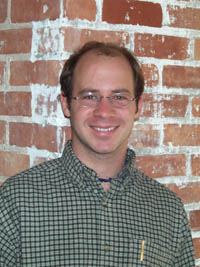 Steve Higgs graduated from Colby College with a BA in Biology and International Environmental Policy in 1998. Prior to joining the Ecosystem Management Initiative, he lived in Washington, DC, where he worked for American Rivers in their dam removal program. He also served as a Research Assistant for Project Performance Corporation providing regulatory training and information technology services for the Environmental Protection Agency and Department of Energy. Before moving to DC, he taught environmental education with various non-governmental organizations in Latin America, including the Belize Audubon Society, The Creative Learning Center of Costa Rica, The Wildlife Conservation Society of Bolivia, and the Mazan Ecological Foundation of Ecuador. His academic and professional interests include alternative dispute resolution processes, involving collaborative decision making, facilitation, and mediation. At EMI, he has written cases for the EMI case database on EM initiatives across the country and is currently working to develop a framework to evaluate the progress of EM projects. Steve Higgs graduated from Colby College with a BA in Biology and International Environmental Policy in 1998. Prior to joining the Ecosystem Management Initiative, he lived in Washington, DC, where he worked for American Rivers in their dam removal program. He also served as a Research Assistant for Project Performance Corporation providing regulatory training and information technology services for the Environmental Protection Agency and Department of Energy. Before moving to DC, he taught environmental education with various non-governmental organizations in Latin America, including the Belize Audubon Society, The Creative Learning Center of Costa Rica, The Wildlife Conservation Society of Bolivia, and the Mazan Ecological Foundation of Ecuador. His academic and professional interests include alternative dispute resolution processes, involving collaborative decision making, facilitation, and mediation. At EMI, he has written cases for the EMI case database on EM initiatives across the country and is currently working to develop a framework to evaluate the progress of EM projects.
Steven Hufnagel
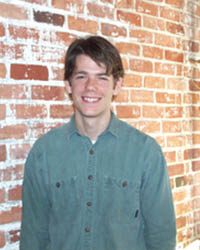 An avid outdoorsman, Steven developed a love of places wild in his home state of New York, both in the Adirondack High Peaks and in his back yard on the banks of the Mianus River. A desire to protect the Mianus from encroaching suburban sprawl led him to become involved in local land use debates and ultimately to join the Town of Bedford Conservation Board in his final two years of high school. At Williams College (Williamstown, MA -- B.A. 1996), Steven majored in Geology and Environmental Studies and managed an extensive trail network as Trails Coordinator for the Williams Outing Club. Following graduation, he moved to Seattle where he worked at the Cascadia Consulting Group for three and a half years as a consultant to county and state natural resource agencies. Specifically, he developed, managed and evaluated environmental education and outreach programs and trainings targeted at educators, residents and students in the areas of recycling, natural lawn care, household toxics and watershed protection. Then, after a year of travel and volunteering in Asia, Steven returned to school to work toward an M.S. in Resource Policy & Behavior at SNRE, where he is now in his second year. This fall at EMI, Steven will review literature on social indicators for evaluation of ecosystem management projects and assist in developing a set of tools for practitioners interested in such evaluation. An avid outdoorsman, Steven developed a love of places wild in his home state of New York, both in the Adirondack High Peaks and in his back yard on the banks of the Mianus River. A desire to protect the Mianus from encroaching suburban sprawl led him to become involved in local land use debates and ultimately to join the Town of Bedford Conservation Board in his final two years of high school. At Williams College (Williamstown, MA -- B.A. 1996), Steven majored in Geology and Environmental Studies and managed an extensive trail network as Trails Coordinator for the Williams Outing Club. Following graduation, he moved to Seattle where he worked at the Cascadia Consulting Group for three and a half years as a consultant to county and state natural resource agencies. Specifically, he developed, managed and evaluated environmental education and outreach programs and trainings targeted at educators, residents and students in the areas of recycling, natural lawn care, household toxics and watershed protection. Then, after a year of travel and volunteering in Asia, Steven returned to school to work toward an M.S. in Resource Policy & Behavior at SNRE, where he is now in his second year. This fall at EMI, Steven will review literature on social indicators for evaluation of ecosystem management projects and assist in developing a set of tools for practitioners interested in such evaluation.
Leah Katz
 Leah Katz is a first year Resource Policy and Behavior student with a concentration in Conservation Biology and Ecosystem Management at the School of Natural Resources and Environment. Leah received her B.A. in Urban Studies and Planning from the University of California, San Diego after completing her research on the County of San Diego's Multiple Species Conservation Program (MSCP) in March 2000. Upon graduating, Leah continued to work with the MSCP team, coordinating stakeholder meetings on planning and implementation issues. She was also responsible for setting up various scientific peer reviews of species documentary reports, as well as working with the County Counsel to edit an in-house MSCP implementation manual. Upon moving to Colorado, Leah became involved with technical editing and review of water resources and Native American water rights appropriation documents. A year later, she joined with The Nature Conservancy's Laramie Foothills program as a Stewardship intern to learn more about management and monitoring tasks associated with conservation easements. Prior to joining the Ecosystem Management Initiative, Leah worked in western Colorado with the GMUG National Forest Core Planning Team to help plan and implement a learning-based public participation effort for an upcoming Forest Plan Revision. Her work focused on training district staff and public participants in collaborative learning skills, as well as providing feedback to the Core Planning Team via interviews. This year, Leah will be investigating how community based collaborative groups evaluate progress towards ecosystem management goals and how this information links back into future decision-making processes. Leah Katz is a first year Resource Policy and Behavior student with a concentration in Conservation Biology and Ecosystem Management at the School of Natural Resources and Environment. Leah received her B.A. in Urban Studies and Planning from the University of California, San Diego after completing her research on the County of San Diego's Multiple Species Conservation Program (MSCP) in March 2000. Upon graduating, Leah continued to work with the MSCP team, coordinating stakeholder meetings on planning and implementation issues. She was also responsible for setting up various scientific peer reviews of species documentary reports, as well as working with the County Counsel to edit an in-house MSCP implementation manual. Upon moving to Colorado, Leah became involved with technical editing and review of water resources and Native American water rights appropriation documents. A year later, she joined with The Nature Conservancy's Laramie Foothills program as a Stewardship intern to learn more about management and monitoring tasks associated with conservation easements. Prior to joining the Ecosystem Management Initiative, Leah worked in western Colorado with the GMUG National Forest Core Planning Team to help plan and implement a learning-based public participation effort for an upcoming Forest Plan Revision. Her work focused on training district staff and public participants in collaborative learning skills, as well as providing feedback to the Core Planning Team via interviews. This year, Leah will be investigating how community based collaborative groups evaluate progress towards ecosystem management goals and how this information links back into future decision-making processes.
Jon Kazmierski
 Jon Kazmierski returned to the School of Natural Resources and Environment after receiving his Bachelor of Science from the School in 1998. Jon is a master's candidate in the Resource Policy and Behavior program, focusing on Conservation Biology and Ecosystem Management. Since graduation, Jon has held positions with both the National Park Service and National Forest Service. As a biological science technician at Isle Royale National Park, Jon worked with the Nature Conservancy on the development of a vegetation map of the Park and assisted the Park in other ecological monitoring projects. On the Inyo National Forest in the Eastern Sierra Nevada, Jon works as a ranger in the John Muir Wilderness where he greets backcountry visitors, restores degraded use areas, and promotes behaviors that ensure the preservation of wilderness resources. Jon is interested in continuing to work for public land management agencies in an effort to promote the ideas and philosophies of ecosystem management. He is a 2001 recipient of a Doris Duke Conservation Fellowship and worked on mid-career assessments and mid-career faculty and alumni affiliates surveys for the Ecosystem Management Initiative. Jon Kazmierski returned to the School of Natural Resources and Environment after receiving his Bachelor of Science from the School in 1998. Jon is a master's candidate in the Resource Policy and Behavior program, focusing on Conservation Biology and Ecosystem Management. Since graduation, Jon has held positions with both the National Park Service and National Forest Service. As a biological science technician at Isle Royale National Park, Jon worked with the Nature Conservancy on the development of a vegetation map of the Park and assisted the Park in other ecological monitoring projects. On the Inyo National Forest in the Eastern Sierra Nevada, Jon works as a ranger in the John Muir Wilderness where he greets backcountry visitors, restores degraded use areas, and promotes behaviors that ensure the preservation of wilderness resources. Jon is interested in continuing to work for public land management agencies in an effort to promote the ideas and philosophies of ecosystem management. He is a 2001 recipient of a Doris Duke Conservation Fellowship and worked on mid-career assessments and mid-career faculty and alumni affiliates surveys for the Ecosystem Management Initiative.
Elizabeth McCance
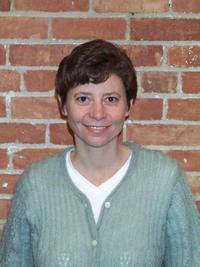 Elizabeth McCance received her undergraduate degree in biology with an emphasis on environmental science from Yale University. She went on for a Masters in Science in Conservation Biology and Sustainable Development from the University of Maryland. After finishing her degree, she pursued her interest in Latin American conservation and interned for several organizations including the National Parks of Argentina and the Wildlife Conservation Society. In 1994, Elizabeth joined IUCN's Species Survival Commission as Special Assistant to the Chair. For three years, she helped to facilitate communication through the network to aid the volunteers assess the global status of species and produce actions plans for their recovery. Moving from international conservation work to local conservation, Elizabeth joined Chicago Wilderness as the Science and Land Management Team Coordinator. Again, her work involved facilitating scientists and other experts to develop conservation strategies. The product of this work was the Biodiversity Recovery Plan for the Chicago Region. Now, as a doctoral student at the School of Natural Resources and Environment, Elizabeth is focusing on ecosystem management and adaptive management, and the evaluation of these strategies. Her work with EMI has included development of the speaker series and other conferences. Currently, she is working on a research project to develop a framework to assess the progress of ecosystem management projects. Elizabeth McCance received her undergraduate degree in biology with an emphasis on environmental science from Yale University. She went on for a Masters in Science in Conservation Biology and Sustainable Development from the University of Maryland. After finishing her degree, she pursued her interest in Latin American conservation and interned for several organizations including the National Parks of Argentina and the Wildlife Conservation Society. In 1994, Elizabeth joined IUCN's Species Survival Commission as Special Assistant to the Chair. For three years, she helped to facilitate communication through the network to aid the volunteers assess the global status of species and produce actions plans for their recovery. Moving from international conservation work to local conservation, Elizabeth joined Chicago Wilderness as the Science and Land Management Team Coordinator. Again, her work involved facilitating scientists and other experts to develop conservation strategies. The product of this work was the Biodiversity Recovery Plan for the Chicago Region. Now, as a doctoral student at the School of Natural Resources and Environment, Elizabeth is focusing on ecosystem management and adaptive management, and the evaluation of these strategies. Her work with EMI has included development of the speaker series and other conferences. Currently, she is working on a research project to develop a framework to assess the progress of ecosystem management projects.
Kathleen Mogelgaard
Jason Mulvihil-Kuntz
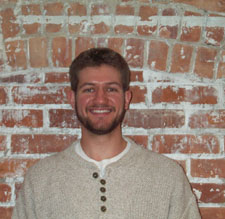 Jason graduated from Carleton College (Northfield, MN) in 2001 with a B.A. in History and Environmental and Technology Studies. Originally from Boulder, CO, Jason developed an appreciation for and interest in efforts to curb urban sprawl and preserve open space and natural areas. In addition, growing up in the Rocky Mountain West provided him with a strong connection with a variety of public lands and an interest in their use and management. He has worked in a variety of capacities with the City of Boulder Open Space Department, coordinated the Environmental and Technology Studies Program at Carleton College, and worked on projects seeking to protect and connect open space and natural areas in Minneapolis and St. Paul with the Minnesota Department of Natural Resources Metro Greenways Program. Currently, Jason is pursuing an M.S. in the Resource Policy and Behavior Program at Michigan's School of Natural Resources and Environment to further develop his interests in conservation planning and public land management. At EMI Jason will be working on case studies focused on collaborative efforts at ecosystem management, which involve the forest service. These studies will be added to a database and website that serves as a resource on collaborative management. Jason graduated from Carleton College (Northfield, MN) in 2001 with a B.A. in History and Environmental and Technology Studies. Originally from Boulder, CO, Jason developed an appreciation for and interest in efforts to curb urban sprawl and preserve open space and natural areas. In addition, growing up in the Rocky Mountain West provided him with a strong connection with a variety of public lands and an interest in their use and management. He has worked in a variety of capacities with the City of Boulder Open Space Department, coordinated the Environmental and Technology Studies Program at Carleton College, and worked on projects seeking to protect and connect open space and natural areas in Minneapolis and St. Paul with the Minnesota Department of Natural Resources Metro Greenways Program. Currently, Jason is pursuing an M.S. in the Resource Policy and Behavior Program at Michigan's School of Natural Resources and Environment to further develop his interests in conservation planning and public land management. At EMI Jason will be working on case studies focused on collaborative efforts at ecosystem management, which involve the forest service. These studies will be added to a database and website that serves as a resource on collaborative management.
Mindy Murch
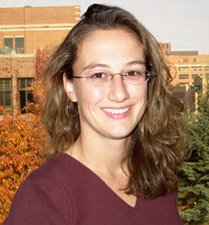 Mindy Murch is a third year student in the Corporate Environmental Management Program, a joint degree Program between the School of Natural Resources and Environment and the Business School. Mindy graduated from Bowdoin College with a Bachelors of Arts in Russian studies and a minor in economics. After graduation, she worked for PricewaterhouseCoopers in the Government Consulting Practice where she conducted strategic planning, financial, process, and organizational analyses. Her clients included the Administrative Office of the United States Courts, the Immigration and Naturalization Service, and the Forest Service. In March of 2000, Mindy left PricewaterhouseCoopers to work for the Forest Service as a strategic planner on the Roadless Area Conservation Rulemaking, an effort to protect almost 59 million acres of public lands from road building and timber harvest. During the summer of 2002, Mindy developed a watershed assessment for a portion of Admiralty Island on the Tongass National Forest in Alaska. Her efforts focused on the analysis of social and economic issues of a Native Alaska tribe. For the summer of 2003, Mindy worked for Holcim (US) Inc., the second largest cement producer in the world, conducting a social and environmental audit of US operations. Upon graduation, Mindy hopes to attain a management role in a government agency or non-profit organization working on rural economic development or land management issues. Mindy Murch is a third year student in the Corporate Environmental Management Program, a joint degree Program between the School of Natural Resources and Environment and the Business School. Mindy graduated from Bowdoin College with a Bachelors of Arts in Russian studies and a minor in economics. After graduation, she worked for PricewaterhouseCoopers in the Government Consulting Practice where she conducted strategic planning, financial, process, and organizational analyses. Her clients included the Administrative Office of the United States Courts, the Immigration and Naturalization Service, and the Forest Service. In March of 2000, Mindy left PricewaterhouseCoopers to work for the Forest Service as a strategic planner on the Roadless Area Conservation Rulemaking, an effort to protect almost 59 million acres of public lands from road building and timber harvest. During the summer of 2002, Mindy developed a watershed assessment for a portion of Admiralty Island on the Tongass National Forest in Alaska. Her efforts focused on the analysis of social and economic issues of a Native Alaska tribe. For the summer of 2003, Mindy worked for Holcim (US) Inc., the second largest cement producer in the world, conducting a social and environmental audit of US operations. Upon graduation, Mindy hopes to attain a management role in a government agency or non-profit organization working on rural economic development or land management issues.
Christine Ogura
 Christine Ogura assists EMI in focussing on the international arena. She will be looking at how ecosystem management is dealt with in other countries in order to draw comparative studies and lessons. Her specific interests include community based natural resource management, collaboration, and evaluation. After graduating from Claremeont McKenna College with a degree in international relations, Christine spent two years working on Capitol Hill for a Member of the U.S. House of Representatives looking at forestry and endangered species issues. She then left Congress to work in the nonprofit sector, first coordinating land acquisition projects for a land conservancy organization dealing with land acquisition for US national parks and most recently working at Conservation International coordinating projects focusing on the conservation of tropical wilderness areas in countries such as Papua New Guinea, Guyana, Democratic Republic of Congo, Indonesia, and Peru. Christine has also had field experience in Kenya studying wildlife management. Christine is in her second year as a Master's candidate in Resource Policy and Behavior focusing on behavior and conservation biology and ecosystem management. She spent the summer of 2002 researching in Pohnpei, an island in Micronesia, working with the Nature Conservancy to evaluate a community based watershed management project. Christine Ogura assists EMI in focussing on the international arena. She will be looking at how ecosystem management is dealt with in other countries in order to draw comparative studies and lessons. Her specific interests include community based natural resource management, collaboration, and evaluation. After graduating from Claremeont McKenna College with a degree in international relations, Christine spent two years working on Capitol Hill for a Member of the U.S. House of Representatives looking at forestry and endangered species issues. She then left Congress to work in the nonprofit sector, first coordinating land acquisition projects for a land conservancy organization dealing with land acquisition for US national parks and most recently working at Conservation International coordinating projects focusing on the conservation of tropical wilderness areas in countries such as Papua New Guinea, Guyana, Democratic Republic of Congo, Indonesia, and Peru. Christine has also had field experience in Kenya studying wildlife management. Christine is in her second year as a Master's candidate in Resource Policy and Behavior focusing on behavior and conservation biology and ecosystem management. She spent the summer of 2002 researching in Pohnpei, an island in Micronesia, working with the Nature Conservancy to evaluate a community based watershed management project.
David Phemister
 David Phemister graduated from Brown University with a BS in Geology in 1994. After graduation he traveled to Australia on an Arnold Fellowship to investigate environmental concerns associated with agricultural and ranching operations. David spent a year working on cattle and sheep ranches in Western Australia to gain firsthand exposure to the country's environmental issues and ranching culture. After returning to the States, he worked for four and a half years at the National Fish and Wildlife Foundation, an environmental grant making organization in Washington, DC. He served as the Foundation's Assistant Director for the Mississippi Valley Region, and much of his work focused on supporting wildlife and habitat conservation in agricultural landscapes. He also served as Program Director for the Save The Tiger Fund, a special project of the Foundation that supported conservation efforts across tiger-range in Asia. David is currently in is second year of graduate study at SNRE and is focusing on land use planning, conservation in rural landscapes, and open space protection. His Master's project is a conservation plan for the Manistee River Watershed in northern Michigan. He is a 2001 recipient of a Doris Duke Conservation Fellowship and worked on fundraising and program development issues for the Ecosystem Management Initiative. David Phemister graduated from Brown University with a BS in Geology in 1994. After graduation he traveled to Australia on an Arnold Fellowship to investigate environmental concerns associated with agricultural and ranching operations. David spent a year working on cattle and sheep ranches in Western Australia to gain firsthand exposure to the country's environmental issues and ranching culture. After returning to the States, he worked for four and a half years at the National Fish and Wildlife Foundation, an environmental grant making organization in Washington, DC. He served as the Foundation's Assistant Director for the Mississippi Valley Region, and much of his work focused on supporting wildlife and habitat conservation in agricultural landscapes. He also served as Program Director for the Save The Tiger Fund, a special project of the Foundation that supported conservation efforts across tiger-range in Asia. David is currently in is second year of graduate study at SNRE and is focusing on land use planning, conservation in rural landscapes, and open space protection. His Master's project is a conservation plan for the Manistee River Watershed in northern Michigan. He is a 2001 recipient of a Doris Duke Conservation Fellowship and worked on fundraising and program development issues for the Ecosystem Management Initiative.
Lauren Pidot
Lauren Pidot is a first-year student pursuing an M.S. through the Environmental Policy and Planning field of study at the University of Michigan 's School of Natural Resources and the Environment (SNRE). Prior to her arrival in Michigan , she spent two years in Washington D.C. working for the National Council for Science and the Environment, an organization dedicated to improving the scientific basis of environmental decision-making. She has also spent time developing and leading environmental education programs in upstate New York , and researching environmental indicator development for the Gulf of Maine Council on the Marine Environment. Lauren received a B.A. in Government from Wesleyan University in 2003, after spending two semesters studying environmental issue in the Southwest and Pacific Northwest with the Audubon Expedition Institute. An ocean and mountain enthusiast, Lauren's interest in working to improve the environmental decision-making process drew her to the University of Michigan despite its landlocked and relatively flat landscape. She looks forward, however, to exploring the Great Lakes region during her time at school.
Chris Riggs
Chris Riggs attended Lawrence University in Appleton, Wisconsin where he received his Bachelor of 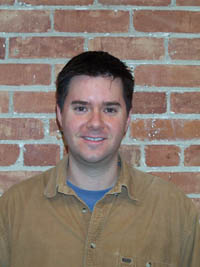 Arts degree in English and Environmental Studies. His professional experience includes environmental education and community outreach with the City of Ann Arbor, and solid waste policy development and program implementation for Washtenaw County, Michigan. As a second year master's student in Resource Policy and Behavior at the University of Michigan's School of Natural Resources & Environment, Chris' interests and research are in watershed conservation planning and collaborative decision-making processes. His contributions to the Ecosystem Management Initiative focussed on helping to develop a series of working papers that identify common trends of successful collaborative resource management partnerships. Chris also assisted with in-depth case study research and writing, and compiling information for the EMI database on community-based conservation projects. Arts degree in English and Environmental Studies. His professional experience includes environmental education and community outreach with the City of Ann Arbor, and solid waste policy development and program implementation for Washtenaw County, Michigan. As a second year master's student in Resource Policy and Behavior at the University of Michigan's School of Natural Resources & Environment, Chris' interests and research are in watershed conservation planning and collaborative decision-making processes. His contributions to the Ecosystem Management Initiative focussed on helping to develop a series of working papers that identify common trends of successful collaborative resource management partnerships. Chris also assisted with in-depth case study research and writing, and compiling information for the EMI database on community-based conservation projects.
Lauren Ris
Heather Rorer
Shelly Rudner
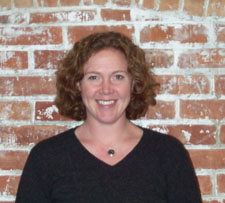 Shelly Rudner graduated from Yale University in 1995 with a BA in Political Science and Studies in the Environment. She is now a master's student at the School of Natural Resources & Environment at the University of Michigan and conducting research at EMI on evaluation of collaborative ecosystem management programs. Prior to her work at EMI, Shelly spent several years with Vantage Partners, a negotiation and relationship management consulting firm in Cambridge, MA. While at Vantage, she was instrumental in developing and implementing the firm's core negotiation and relationship management methodologies, tools, and implementation vehicles. Shelly recently co-authored an article on negotiation and relationship management strategy recently published in Consulting to Management (formerly The Journal of Management Consulting). She also has done a great deal of work with innovative implementation strategies, including on-line toolkits. Prior to joining Vantage Partners, Shelly worked for a nonprofit human services organization where she designed and procured funding for innovative social service programs. Her previous experience includes work at a public affairs consulting firm in Washington, DC, where her work included facilitating public involvement at Superfund sites. Shelly Rudner graduated from Yale University in 1995 with a BA in Political Science and Studies in the Environment. She is now a master's student at the School of Natural Resources & Environment at the University of Michigan and conducting research at EMI on evaluation of collaborative ecosystem management programs. Prior to her work at EMI, Shelly spent several years with Vantage Partners, a negotiation and relationship management consulting firm in Cambridge, MA. While at Vantage, she was instrumental in developing and implementing the firm's core negotiation and relationship management methodologies, tools, and implementation vehicles. Shelly recently co-authored an article on negotiation and relationship management strategy recently published in Consulting to Management (formerly The Journal of Management Consulting). She also has done a great deal of work with innovative implementation strategies, including on-line toolkits. Prior to joining Vantage Partners, Shelly worked for a nonprofit human services organization where she designed and procured funding for innovative social service programs. Her previous experience includes work at a public affairs consulting firm in Washington, DC, where her work included facilitating public involvement at Superfund sites.
Lisa Spalding
Lisa Spalding graduated from Oberlin College in 2000 with a B.A. in Environmental Studies and a minor in Religion. Prior to attending the University of Michigan , she lived in Boston and worked for the New England Aquarium's Conservation Division. There, she managed the Marine Conservation Action Fund (MCAF), which provides emergency funding to community-based aquatic conservation projects around the world. She also worked with a team to develop films, books, and exhibits on climate change and biodiversity, and the Aquarium's EcoSound Project to develop reports assessing the viability of specific commercial fish stocks for a national supermarket retailer. Over the last 8 years, Lisa has taught environmental education and teacher training programs with several non-profit organizations, including the Boston Museum of Science, Olbrich Botanical Gardens in Wisconsin , Crowne Point Ecology Learning Center in Ohio , and Shelbourne Farms in Vermont . She also worked with the US Forest Service and the University of North Carolina , to research the potential of landscape corridors to connect fragmented environments in South Carolina . Now at the School of Natural Resources and Environment, Lisa's primary interests are in helping environmental non-profit organizations develop more collaborative, adaptive strategies to effectively manage the complex natural resources issues of the future.
Wes Wong
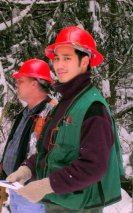
Wes comes to EMI after four years as a soils, botany, and forestry specialist with the Bureau of Land Management in Salem , Oregon. At BLM he represented a younger generation in natural resource management. In the Pacific Northwest, he dealt with the public land challenges of preserving endangered species habitat, protecting clean water, and departing from historically high timber production. Wes earned a B.S. in Environmental Biology and Management from University of California, Davis in 2002. As an undergraduate he studied tropical biodiversity and sustainable community issues in Monteverde, Costa Rica. Under a National Science Foundation grant, he investigated intertidal arthropod distribution in Baja, California. Currently, Wes is on educational leave from the US Forest Service. When he reports to the Mt. Hood National Forest he will apply ecosystem based management principles to habitat rehabilitation projects. His current Master's work at the School of Natural Resources and Environment focuses on conservation biology.
|
 |



 Amanda is a first-year M.S. student at the University of Michigan’s School of Natural Resources and the Environment (SNRE), specializing in Environmental Policy and Planning. She received her B.A. in Earth and Planetary Sciences from Washington University in St. Louis in 2004. After, she was a Grants Coordinator for the Biology Department at Georgia State University. From 2005-2008, Amanda served in Peace Corps Madagascar as a Parks and Agriculture Volunteer. She worked extensively with a community park to promote transparent management practices, as well as develop community projects with a local farmers association, including permaculture and SRI (Système de Riz Intensification). She also worked with the Andrew Lees Trust in Fianarantsoa, Madagascar, producing educational radio programming throughout Southern Madagascar with solar powered radios and listening groups. Amanda’s interest in sustainable public and community land management brought her to work with the Ecosystems Management Initiative.
Amanda is a first-year M.S. student at the University of Michigan’s School of Natural Resources and the Environment (SNRE), specializing in Environmental Policy and Planning. She received her B.A. in Earth and Planetary Sciences from Washington University in St. Louis in 2004. After, she was a Grants Coordinator for the Biology Department at Georgia State University. From 2005-2008, Amanda served in Peace Corps Madagascar as a Parks and Agriculture Volunteer. She worked extensively with a community park to promote transparent management practices, as well as develop community projects with a local farmers association, including permaculture and SRI (Système de Riz Intensification). She also worked with the Andrew Lees Trust in Fianarantsoa, Madagascar, producing educational radio programming throughout Southern Madagascar with solar powered radios and listening groups. Amanda’s interest in sustainable public and community land management brought her to work with the Ecosystems Management Initiative.  Ria Berns is a first-year dual degreestudent pursuingan M.S. in Environmental Policy and Planning at the School of Natural Resources and Environment and an M.P.P. at the Gerald R. Ford School of Public Policy. Before arriving in Michigan, Ria worked as anenvironmental policy consultant in Seattle where she advised state and federal environmental agencies on a range of issues including, lean and green manufacturing, clean diesel initiatives, Great Lakes water quality, and climate change strategy. Growing up in Washington (State) and Alaska imparted upon Ria a love of wilderness and salt water. Her primary policy interests center around these issues, specifically ocean and water policy, and climate change adaptation. Ria received a B.A. in Political Science from Williams College in 2004.
Ria Berns is a first-year dual degreestudent pursuingan M.S. in Environmental Policy and Planning at the School of Natural Resources and Environment and an M.P.P. at the Gerald R. Ford School of Public Policy. Before arriving in Michigan, Ria worked as anenvironmental policy consultant in Seattle where she advised state and federal environmental agencies on a range of issues including, lean and green manufacturing, clean diesel initiatives, Great Lakes water quality, and climate change strategy. Growing up in Washington (State) and Alaska imparted upon Ria a love of wilderness and salt water. Her primary policy interests center around these issues, specifically ocean and water policy, and climate change adaptation. Ria received a B.A. in Political Science from Williams College in 2004. Clayton, a fourth generation Wyomingite, grew up on the eastern slope of the Greater YellowstoneEcosystem and spent his youth exploring, riding, and fishing some of the last wild placesinourcountry. He attended his state’s only university, the University of Wyoming, receiving degrees inEconomics and Environment and Natural Resources in 2008. While at the University of Michigan,Clayton is focusing his study on public land policy and natural resource conflict in the Intermountain West. His master’s thesis explores the integration of mule deer management into the federal agency planning processes with regard to oil and gas leasing on the West’s public lands. Over the past summer Clayton interned with the Theodore Roosevelt Conservation Partnership working on these issues. After graduation, Clayton looks forward to returning to the open spaces and rural communities of Wyoming. He anticipates working for anadvocacy organization,mobilizing communities and hunting and fishing interests in protecting Wyoming’s wild landscapes and unique cultural heritage with contemporary pressures of development.
Clayton, a fourth generation Wyomingite, grew up on the eastern slope of the Greater YellowstoneEcosystem and spent his youth exploring, riding, and fishing some of the last wild placesinourcountry. He attended his state’s only university, the University of Wyoming, receiving degrees inEconomics and Environment and Natural Resources in 2008. While at the University of Michigan,Clayton is focusing his study on public land policy and natural resource conflict in the Intermountain West. His master’s thesis explores the integration of mule deer management into the federal agency planning processes with regard to oil and gas leasing on the West’s public lands. Over the past summer Clayton interned with the Theodore Roosevelt Conservation Partnership working on these issues. After graduation, Clayton looks forward to returning to the open spaces and rural communities of Wyoming. He anticipates working for anadvocacy organization,mobilizing communities and hunting and fishing interests in protecting Wyoming’s wild landscapes and unique cultural heritage with contemporary pressures of development.  Matt is interested in public land planning and management, specifically in regards to protected areas. His research is focused on the siting of solar energy facilities in the California desert. He also completed an internship with the National Park Service at Golden Gate National Recreation Area, where he developed the park's ocean stewardship plan. Before graduate school, Matt was an outdoor skills instructor for the East Bay Regional Park District in Oakland, California. He has also worked for the U.S. Fish and Wildlife Service and as a trail crew foreman and backpacking guide in northern New Mexico. Matt holds a BS in environmental sciences from the University of California, Berkeley.
Matt is interested in public land planning and management, specifically in regards to protected areas. His research is focused on the siting of solar energy facilities in the California desert. He also completed an internship with the National Park Service at Golden Gate National Recreation Area, where he developed the park's ocean stewardship plan. Before graduate school, Matt was an outdoor skills instructor for the East Bay Regional Park District in Oakland, California. He has also worked for the U.S. Fish and Wildlife Service and as a trail crew foreman and backpacking guide in northern New Mexico. Matt holds a BS in environmental sciences from the University of California, Berkeley. mountains and forests of the western U.S., developing a love for wild places. After earning a B.S. in Biology from Western Washington University, he spent several years working on wildlife surveys for the USDA Forest Service in Montana and California, and working for a NGO in Afghanistan. Additionally, Colin served as the Assistant Director for Snowboarding at Big Sky Resort, in Big Sky, Montana. Colin continues to focus on the conservation potential of both public and private lands, through development of best use and management practices in his Masters studies. Colin is part of a team of graduate researchers investigating marine ecosystem-based management initiatives throughout the world. During the summer of 2009 he worked for the Huron River Watershed Council as a coordinator of their Bioreserve program, leading teams of volunteers on environmental assessments of natural areas throughout the watershed.
mountains and forests of the western U.S., developing a love for wild places. After earning a B.S. in Biology from Western Washington University, he spent several years working on wildlife surveys for the USDA Forest Service in Montana and California, and working for a NGO in Afghanistan. Additionally, Colin served as the Assistant Director for Snowboarding at Big Sky Resort, in Big Sky, Montana. Colin continues to focus on the conservation potential of both public and private lands, through development of best use and management practices in his Masters studies. Colin is part of a team of graduate researchers investigating marine ecosystem-based management initiatives throughout the world. During the summer of 2009 he worked for the Huron River Watershed Council as a coordinator of their Bioreserve program, leading teams of volunteers on environmental assessments of natural areas throughout the watershed. Jennifer is a Ph.D student in the School of Natural Resources and Environment. She employs interdisciplinary theory and methodology from anthropology, political ecology, history and fisheries science to analyze the interconnections between ecological and socio-economic, political and cultural change in the Lake Victoria Basin in East Africa. Jennifer also conducts case study research on marine ecosystem-based management in the Wadden Sea in Northern Europe, the West Coast of the United States, the North American Great Lakes and on the East Coast of Africa. Prior to beginning her graduate studies, Jennifer studied International Political Economy at the Colorado College and worked for the Marine Fish Conservation Network in Washington, DC. While obtaining her M.S., Jennifer worked for the National Oceanic and Atmospheric Administration’s Great Lakes Environmental Research Lab and the Blue Ocean Institute. Jennifer is the founder and co-host of “
Jennifer is a Ph.D student in the School of Natural Resources and Environment. She employs interdisciplinary theory and methodology from anthropology, political ecology, history and fisheries science to analyze the interconnections between ecological and socio-economic, political and cultural change in the Lake Victoria Basin in East Africa. Jennifer also conducts case study research on marine ecosystem-based management in the Wadden Sea in Northern Europe, the West Coast of the United States, the North American Great Lakes and on the East Coast of Africa. Prior to beginning her graduate studies, Jennifer studied International Political Economy at the Colorado College and worked for the Marine Fish Conservation Network in Washington, DC. While obtaining her M.S., Jennifer worked for the National Oceanic and Atmospheric Administration’s Great Lakes Environmental Research Lab and the Blue Ocean Institute. Jennifer is the founder and co-host of “ University of Michigan’s School of Natural Resources and Environment. She earned a Bachelor of Science in Environmental and Natural Resources with a concentration in Economic Policy from Clemson University in 2004. She has worked at Shenandoah National Park, in support of Bandhavgarh National Park in India, and as an Outdoor Educator in New England. While working for The Nature Conservancy’s Chesapeake Bay Initiative she became familiar with the logistics of large scale conservation and project coordination. Based on her interest in watershed functionality, Amy’s master’s research focuses on the interface between terrestrial ecosystem management decisions and freshwater ecological response. Other research experiences include the development of conservation measures for the Green River project in Kentucky, marine ecosystem based management, and regulatory response to the impact of wet weather events on water quality.
University of Michigan’s School of Natural Resources and Environment. She earned a Bachelor of Science in Environmental and Natural Resources with a concentration in Economic Policy from Clemson University in 2004. She has worked at Shenandoah National Park, in support of Bandhavgarh National Park in India, and as an Outdoor Educator in New England. While working for The Nature Conservancy’s Chesapeake Bay Initiative she became familiar with the logistics of large scale conservation and project coordination. Based on her interest in watershed functionality, Amy’s master’s research focuses on the interface between terrestrial ecosystem management decisions and freshwater ecological response. Other research experiences include the development of conservation measures for the Green River project in Kentucky, marine ecosystem based management, and regulatory response to the impact of wet weather events on water quality. and Art History from Washington University in St. Louis in 1998. After several years working in the art world, she transitioned to the travel industry. Her professional experience afforded opportunities to travel to some of the world’s most remote and beautiful places, including the Peruvian Amazon and the South Shetland Islands of Antarctica. Travel inspired her to make a change in profession, and she returned to grad school to pursue a career in natural resources. Sarah is pursuing a Masters of Science at the University of Michigan’s School of Natural Resources and Environment, focusing on Environmental Policy and Planning, and Conservation Biology. She is particularly interested in public lands policy and conservation planning. Her master’s research focuses on the potential ecological impacts of siting utility-scale solar facilities on public land in the California Desert. Additional experience includes marine ecosystem based management and renewable energy policy.
and Art History from Washington University in St. Louis in 1998. After several years working in the art world, she transitioned to the travel industry. Her professional experience afforded opportunities to travel to some of the world’s most remote and beautiful places, including the Peruvian Amazon and the South Shetland Islands of Antarctica. Travel inspired her to make a change in profession, and she returned to grad school to pursue a career in natural resources. Sarah is pursuing a Masters of Science at the University of Michigan’s School of Natural Resources and Environment, focusing on Environmental Policy and Planning, and Conservation Biology. She is particularly interested in public lands policy and conservation planning. Her master’s research focuses on the potential ecological impacts of siting utility-scale solar facilities on public land in the California Desert. Additional experience includes marine ecosystem based management and renewable energy policy.  Mary Adelzadeh is a native of northern Arizona. Mary's Navajo upbringing and strong interest in the environment led her to pursue a B.S. in Environmental Biology and Management from the University of California, Davis. Immediately after graduation, Mary began work in the non-profit sector, first, with the federal Bureau of Land Management as a training coordinator for team-taught workshops on community-based collaborative resource management and community volunteerism. The workshops focused on improving intergroup relations, civic engagement, and collaboration among resource-dependent communities, environmentalists, and public land managers throughout the West. More recently, Mary worked as a community organizer for an environmental and social justice organization in Nevada, where she focused on bringing federal land management agencies, private mining interests, and Native Americans together to shape government policy regarding the impact of mining on ancestral Indian lands and sacred sites. Mary's commitment to conservation brought her to the School of Natural Resources and Environment at the University of Michigan to pursue a Master's degree in Resource Policy and Behavior, with an emphasis on collaboration and conflict management. Mary's career goal is to help restore ecosystems while preserving Native American values and customs associated with the land. She hopes to achieve this by facilitating collaboration between Native American communities and government agencies charged with managing public lands, and through the reintegration of traditional ecological knowledge in land management practices.
Mary Adelzadeh is a native of northern Arizona. Mary's Navajo upbringing and strong interest in the environment led her to pursue a B.S. in Environmental Biology and Management from the University of California, Davis. Immediately after graduation, Mary began work in the non-profit sector, first, with the federal Bureau of Land Management as a training coordinator for team-taught workshops on community-based collaborative resource management and community volunteerism. The workshops focused on improving intergroup relations, civic engagement, and collaboration among resource-dependent communities, environmentalists, and public land managers throughout the West. More recently, Mary worked as a community organizer for an environmental and social justice organization in Nevada, where she focused on bringing federal land management agencies, private mining interests, and Native Americans together to shape government policy regarding the impact of mining on ancestral Indian lands and sacred sites. Mary's commitment to conservation brought her to the School of Natural Resources and Environment at the University of Michigan to pursue a Master's degree in Resource Policy and Behavior, with an emphasis on collaboration and conflict management. Mary's career goal is to help restore ecosystems while preserving Native American values and customs associated with the land. She hopes to achieve this by facilitating collaboration between Native American communities and government agencies charged with managing public lands, and through the reintegration of traditional ecological knowledge in land management practices.  Originally from Baltimore, Maryland, Adam graduated from the University of New Hampshire in 2001 with a B.S. in Environmental Conservation. In the fall of 1999 Adam spent a semester at the Arava Institute for Environmental Studies in southern Israel studying sustainable and organic desert agriculture and coral reef ecology. After college he worked for a small municipal land-use consulting firm in southern New Hampshire. His work focused primarily on preparing conservation plans, master plan revisions, and zoning ordinance amendments, and providing general planning assistance for a number of towns. A conservation plan he helped author for the Town of Newmarket, NH is responsible for protecting hundreds of acres of land since its adoption and implementation by the Town in early 2002. As a first year Masters student in the School of Natural Resources and Environment, Adam's current academic interests lie in exploring and developing ways to proactively engage communities in land conservation and in evaluating the success of conservation programs in meeting their stated goals. He is also interested in identifying and/or creating opportunities to further land conservation within existing local, state, and national policy structures.
Originally from Baltimore, Maryland, Adam graduated from the University of New Hampshire in 2001 with a B.S. in Environmental Conservation. In the fall of 1999 Adam spent a semester at the Arava Institute for Environmental Studies in southern Israel studying sustainable and organic desert agriculture and coral reef ecology. After college he worked for a small municipal land-use consulting firm in southern New Hampshire. His work focused primarily on preparing conservation plans, master plan revisions, and zoning ordinance amendments, and providing general planning assistance for a number of towns. A conservation plan he helped author for the Town of Newmarket, NH is responsible for protecting hundreds of acres of land since its adoption and implementation by the Town in early 2002. As a first year Masters student in the School of Natural Resources and Environment, Adam's current academic interests lie in exploring and developing ways to proactively engage communities in land conservation and in evaluating the success of conservation programs in meeting their stated goals. He is also interested in identifying and/or creating opportunities to further land conservation within existing local, state, and national policy structures. Originally from South Dakota, Dave Chadwick graduated from Pomona College with a BA in Politics in 1995. After college, he spent three and a half years in Washington, DC, on the staff of Senator Dianne Feinstein (D-California). During that time, he did everything from answering mail to advising the Senator on a range of environmental and agricultural issues. His background also includes work for a nonpartisan policy research group in Minneapolis, Minnesota, and a season of stream surveying for the US Forest Service in northwest Colorado. While living in Minnesota, Dave was an active volunteer with the Minnesota Land Trust and at a local wildlife refuge. Dave is a first-year Master's student in the Resource Policy and Behavior program at the School of Natural Resources and Environment, focusing on public land policy, land conservation, and citizen involvement in resource management. As a research associate with EMI, Dave is helping investigate state-based ecosystem management
Originally from South Dakota, Dave Chadwick graduated from Pomona College with a BA in Politics in 1995. After college, he spent three and a half years in Washington, DC, on the staff of Senator Dianne Feinstein (D-California). During that time, he did everything from answering mail to advising the Senator on a range of environmental and agricultural issues. His background also includes work for a nonpartisan policy research group in Minneapolis, Minnesota, and a season of stream surveying for the US Forest Service in northwest Colorado. While living in Minnesota, Dave was an active volunteer with the Minnesota Land Trust and at a local wildlife refuge. Dave is a first-year Master's student in the Resource Policy and Behavior program at the School of Natural Resources and Environment, focusing on public land policy, land conservation, and citizen involvement in resource management. As a research associate with EMI, Dave is helping investigate state-based ecosystem management  Anne Finken is a second-year student pursuing an M.S. in Natural Resource Policy and Behavior at the School of Natural Resources and Environment and a J.D. at the University of Michigan Law School. Anne is originally from Iowa City, Iowa and graduated from Goucher College with a B.A. in Chemistry in 1999. After college, Anne researched habitat restoration programs initiated by the U.S. Army Corps of Engineers and water quality monitoring efforts in the Upper Mississippi River Basin as an intern at American Rivers in Washington D.C. After interning, she worked for a consulting firm where she primarily provided environmental regulatory support. This included analysis and review of air regulations at the federal, state, and local level as well as data analysis and calculation related to air emissions. Anne has also taught high school chemistry in the D.C. Metro area. At EMI, Anne is investigating how collaborative resource organizations track their accomplishments over time and how they evaluate their progress towards achieving established goals.
Anne Finken is a second-year student pursuing an M.S. in Natural Resource Policy and Behavior at the School of Natural Resources and Environment and a J.D. at the University of Michigan Law School. Anne is originally from Iowa City, Iowa and graduated from Goucher College with a B.A. in Chemistry in 1999. After college, Anne researched habitat restoration programs initiated by the U.S. Army Corps of Engineers and water quality monitoring efforts in the Upper Mississippi River Basin as an intern at American Rivers in Washington D.C. After interning, she worked for a consulting firm where she primarily provided environmental regulatory support. This included analysis and review of air regulations at the federal, state, and local level as well as data analysis and calculation related to air emissions. Anne has also taught high school chemistry in the D.C. Metro area. At EMI, Anne is investigating how collaborative resource organizations track their accomplishments over time and how they evaluate their progress towards achieving established goals. Liz Hamilton is a first-year student pursuing an M.S. in Natural Resource Policy and Behavior at the School of Natural Resources and Environment and an M.B.A. at the University of Michigan Business School. Before coming to Michigan, Liz spent three years working as part of The Nature Conservancy's national science team. Liz led a study that measured the impacts of a $6 million dollar Ecosystem Research Program. She also worked on organizational analyses involving the future of coastal and marine conservation and opportunities for using social science tools in conservation. Before that, she helped write toxicological profiles of hazardous substances for a health and environmental consulting company. Liz received a B.A. in Biology from Cornell University in 1998, and she spent a wonderful semester studying rainforest, marine, and Aboriginal cultural ecology in Queensland, Australia, through the School for International Training in 1997. Liz is broadly interested in developing human communities that effectively balance ecological and social considerations and in applying the suite of scientific and political strategies for biodiversity conservation. She is also interested in bringing effective business models to nonprofit organizations and public agencies, and conversely, bringing an understanding to businesses of how to contribute to biodiversity conservation. She believes that conservation success hinges upon successful partnerships among the nonprofit, government, and for-profit sectors. After Michigan, Liz hopes to combine these interests in science, policy, and management working for a nonprofit conservation organization.
Liz Hamilton is a first-year student pursuing an M.S. in Natural Resource Policy and Behavior at the School of Natural Resources and Environment and an M.B.A. at the University of Michigan Business School. Before coming to Michigan, Liz spent three years working as part of The Nature Conservancy's national science team. Liz led a study that measured the impacts of a $6 million dollar Ecosystem Research Program. She also worked on organizational analyses involving the future of coastal and marine conservation and opportunities for using social science tools in conservation. Before that, she helped write toxicological profiles of hazardous substances for a health and environmental consulting company. Liz received a B.A. in Biology from Cornell University in 1998, and she spent a wonderful semester studying rainforest, marine, and Aboriginal cultural ecology in Queensland, Australia, through the School for International Training in 1997. Liz is broadly interested in developing human communities that effectively balance ecological and social considerations and in applying the suite of scientific and political strategies for biodiversity conservation. She is also interested in bringing effective business models to nonprofit organizations and public agencies, and conversely, bringing an understanding to businesses of how to contribute to biodiversity conservation. She believes that conservation success hinges upon successful partnerships among the nonprofit, government, and for-profit sectors. After Michigan, Liz hopes to combine these interests in science, policy, and management working for a nonprofit conservation organization.  Steve Higgs graduated from Colby College with a BA in Biology and International Environmental Policy in 1998. Prior to joining the Ecosystem Management Initiative, he lived in Washington, DC, where he worked for American Rivers in their dam removal program. He also served as a Research Assistant for Project Performance Corporation providing regulatory training and information technology services for the Environmental Protection Agency and Department of Energy. Before moving to DC, he taught environmental education with various non-governmental organizations in Latin America, including the Belize Audubon Society, The Creative Learning Center of Costa Rica, The Wildlife Conservation Society of Bolivia, and the Mazan Ecological Foundation of Ecuador. His academic and professional interests include alternative dispute resolution processes, involving collaborative decision making, facilitation, and mediation. At EMI, he has written cases for the EMI case database on EM initiatives across the country and is currently working to develop a framework to evaluate the progress of EM projects.
Steve Higgs graduated from Colby College with a BA in Biology and International Environmental Policy in 1998. Prior to joining the Ecosystem Management Initiative, he lived in Washington, DC, where he worked for American Rivers in their dam removal program. He also served as a Research Assistant for Project Performance Corporation providing regulatory training and information technology services for the Environmental Protection Agency and Department of Energy. Before moving to DC, he taught environmental education with various non-governmental organizations in Latin America, including the Belize Audubon Society, The Creative Learning Center of Costa Rica, The Wildlife Conservation Society of Bolivia, and the Mazan Ecological Foundation of Ecuador. His academic and professional interests include alternative dispute resolution processes, involving collaborative decision making, facilitation, and mediation. At EMI, he has written cases for the EMI case database on EM initiatives across the country and is currently working to develop a framework to evaluate the progress of EM projects.  An avid outdoorsman, Steven developed a love of places wild in his home state of New York, both in the Adirondack High Peaks and in his back yard on the banks of the Mianus River. A desire to protect the Mianus from encroaching suburban sprawl led him to become involved in local land use debates and ultimately to join the Town of Bedford Conservation Board in his final two years of high school. At Williams College (Williamstown, MA -- B.A. 1996), Steven majored in Geology and Environmental Studies and managed an extensive trail network as Trails Coordinator for the Williams Outing Club. Following graduation, he moved to Seattle where he worked at the Cascadia Consulting Group for three and a half years as a consultant to county and state natural resource agencies. Specifically, he developed, managed and evaluated environmental education and outreach programs and trainings targeted at educators, residents and students in the areas of recycling, natural lawn care, household toxics and watershed protection. Then, after a year of travel and volunteering in Asia, Steven returned to school to work toward an M.S. in Resource Policy & Behavior at SNRE, where he is now in his second year. This fall at EMI, Steven will review literature on social indicators for evaluation of ecosystem management projects and assist in developing a set of tools for practitioners interested in such evaluation.
An avid outdoorsman, Steven developed a love of places wild in his home state of New York, both in the Adirondack High Peaks and in his back yard on the banks of the Mianus River. A desire to protect the Mianus from encroaching suburban sprawl led him to become involved in local land use debates and ultimately to join the Town of Bedford Conservation Board in his final two years of high school. At Williams College (Williamstown, MA -- B.A. 1996), Steven majored in Geology and Environmental Studies and managed an extensive trail network as Trails Coordinator for the Williams Outing Club. Following graduation, he moved to Seattle where he worked at the Cascadia Consulting Group for three and a half years as a consultant to county and state natural resource agencies. Specifically, he developed, managed and evaluated environmental education and outreach programs and trainings targeted at educators, residents and students in the areas of recycling, natural lawn care, household toxics and watershed protection. Then, after a year of travel and volunteering in Asia, Steven returned to school to work toward an M.S. in Resource Policy & Behavior at SNRE, where he is now in his second year. This fall at EMI, Steven will review literature on social indicators for evaluation of ecosystem management projects and assist in developing a set of tools for practitioners interested in such evaluation. Leah Katz is a first year Resource Policy and Behavior student with a concentration in Conservation Biology and Ecosystem Management at the School of Natural Resources and Environment. Leah received her B.A. in Urban Studies and Planning from the University of California, San Diego after completing her research on the County of San Diego's Multiple Species Conservation Program (MSCP) in March 2000. Upon graduating, Leah continued to work with the MSCP team, coordinating stakeholder meetings on planning and implementation issues. She was also responsible for setting up various scientific peer reviews of species documentary reports, as well as working with the County Counsel to edit an in-house MSCP implementation manual. Upon moving to Colorado, Leah became involved with technical editing and review of water resources and Native American water rights appropriation documents. A year later, she joined with The Nature Conservancy's Laramie Foothills program as a Stewardship intern to learn more about management and monitoring tasks associated with conservation easements. Prior to joining the Ecosystem Management Initiative, Leah worked in western Colorado with the GMUG National Forest Core Planning Team to help plan and implement a learning-based public participation effort for an upcoming Forest Plan Revision. Her work focused on training district staff and public participants in collaborative learning skills, as well as providing feedback to the Core Planning Team via interviews. This year, Leah will be investigating how community based collaborative groups evaluate progress towards ecosystem management goals and how this information links back into future decision-making processes.
Leah Katz is a first year Resource Policy and Behavior student with a concentration in Conservation Biology and Ecosystem Management at the School of Natural Resources and Environment. Leah received her B.A. in Urban Studies and Planning from the University of California, San Diego after completing her research on the County of San Diego's Multiple Species Conservation Program (MSCP) in March 2000. Upon graduating, Leah continued to work with the MSCP team, coordinating stakeholder meetings on planning and implementation issues. She was also responsible for setting up various scientific peer reviews of species documentary reports, as well as working with the County Counsel to edit an in-house MSCP implementation manual. Upon moving to Colorado, Leah became involved with technical editing and review of water resources and Native American water rights appropriation documents. A year later, she joined with The Nature Conservancy's Laramie Foothills program as a Stewardship intern to learn more about management and monitoring tasks associated with conservation easements. Prior to joining the Ecosystem Management Initiative, Leah worked in western Colorado with the GMUG National Forest Core Planning Team to help plan and implement a learning-based public participation effort for an upcoming Forest Plan Revision. Her work focused on training district staff and public participants in collaborative learning skills, as well as providing feedback to the Core Planning Team via interviews. This year, Leah will be investigating how community based collaborative groups evaluate progress towards ecosystem management goals and how this information links back into future decision-making processes.  Jon Kazmierski returned to the School of Natural Resources and Environment after receiving his Bachelor of Science from the School in 1998. Jon is a master's candidate in the Resource Policy and Behavior program, focusing on Conservation Biology and Ecosystem Management. Since graduation, Jon has held positions with both the National Park Service and National Forest Service. As a biological science technician at Isle Royale National Park, Jon worked with the Nature Conservancy on the development of a vegetation map of the Park and assisted the Park in other ecological monitoring projects. On the Inyo National Forest in the Eastern Sierra Nevada, Jon works as a ranger in the John Muir Wilderness where he greets backcountry visitors, restores degraded use areas, and promotes behaviors that ensure the preservation of wilderness resources. Jon is interested in continuing to work for public land management agencies in an effort to promote the ideas and philosophies of ecosystem management. He is a 2001 recipient of a
Jon Kazmierski returned to the School of Natural Resources and Environment after receiving his Bachelor of Science from the School in 1998. Jon is a master's candidate in the Resource Policy and Behavior program, focusing on Conservation Biology and Ecosystem Management. Since graduation, Jon has held positions with both the National Park Service and National Forest Service. As a biological science technician at Isle Royale National Park, Jon worked with the Nature Conservancy on the development of a vegetation map of the Park and assisted the Park in other ecological monitoring projects. On the Inyo National Forest in the Eastern Sierra Nevada, Jon works as a ranger in the John Muir Wilderness where he greets backcountry visitors, restores degraded use areas, and promotes behaviors that ensure the preservation of wilderness resources. Jon is interested in continuing to work for public land management agencies in an effort to promote the ideas and philosophies of ecosystem management. He is a 2001 recipient of a  Elizabeth McCance received her undergraduate degree in biology with an emphasis on environmental science from Yale University. She went on for a Masters in Science in Conservation Biology and Sustainable Development from the University of Maryland. After finishing her degree, she pursued her interest in Latin American conservation and interned for several organizations including the National Parks of Argentina and the Wildlife Conservation Society. In 1994, Elizabeth joined IUCN's Species Survival Commission as Special Assistant to the Chair. For three years, she helped to facilitate communication through the network to aid the volunteers assess the global status of species and produce actions plans for their recovery. Moving from international conservation work to local conservation, Elizabeth joined Chicago Wilderness as the Science and Land Management Team Coordinator. Again, her work involved facilitating scientists and other experts to develop conservation strategies. The product of this work was the Biodiversity Recovery Plan for the Chicago Region. Now, as a doctoral student at the School of Natural Resources and Environment, Elizabeth is focusing on ecosystem management and adaptive management, and the evaluation of these strategies. Her work with EMI has included development of the speaker series and other conferences. Currently, she is working on a research project to develop a framework to assess the progress of ecosystem management projects.
Elizabeth McCance received her undergraduate degree in biology with an emphasis on environmental science from Yale University. She went on for a Masters in Science in Conservation Biology and Sustainable Development from the University of Maryland. After finishing her degree, she pursued her interest in Latin American conservation and interned for several organizations including the National Parks of Argentina and the Wildlife Conservation Society. In 1994, Elizabeth joined IUCN's Species Survival Commission as Special Assistant to the Chair. For three years, she helped to facilitate communication through the network to aid the volunteers assess the global status of species and produce actions plans for their recovery. Moving from international conservation work to local conservation, Elizabeth joined Chicago Wilderness as the Science and Land Management Team Coordinator. Again, her work involved facilitating scientists and other experts to develop conservation strategies. The product of this work was the Biodiversity Recovery Plan for the Chicago Region. Now, as a doctoral student at the School of Natural Resources and Environment, Elizabeth is focusing on ecosystem management and adaptive management, and the evaluation of these strategies. Her work with EMI has included development of the speaker series and other conferences. Currently, she is working on a research project to develop a framework to assess the progress of ecosystem management projects.  Jason graduated from Carleton College (Northfield, MN) in 2001 with a B.A. in History and Environmental and Technology Studies. Originally from Boulder, CO, Jason developed an appreciation for and interest in efforts to curb urban sprawl and preserve open space and natural areas. In addition, growing up in the Rocky Mountain West provided him with a strong connection with a variety of public lands and an interest in their use and management. He has worked in a variety of capacities with the City of Boulder Open Space Department, coordinated the Environmental and Technology Studies Program at Carleton College, and worked on projects seeking to protect and connect open space and natural areas in Minneapolis and St. Paul with the Minnesota Department of Natural Resources Metro Greenways Program. Currently, Jason is pursuing an M.S. in the Resource Policy and Behavior Program at Michigan's School of Natural Resources and Environment to further develop his interests in conservation planning and public land management. At EMI Jason will be working on case studies focused on collaborative efforts at ecosystem management, which involve the forest service. These studies will be added to a database and website that serves as a resource on collaborative management.
Jason graduated from Carleton College (Northfield, MN) in 2001 with a B.A. in History and Environmental and Technology Studies. Originally from Boulder, CO, Jason developed an appreciation for and interest in efforts to curb urban sprawl and preserve open space and natural areas. In addition, growing up in the Rocky Mountain West provided him with a strong connection with a variety of public lands and an interest in their use and management. He has worked in a variety of capacities with the City of Boulder Open Space Department, coordinated the Environmental and Technology Studies Program at Carleton College, and worked on projects seeking to protect and connect open space and natural areas in Minneapolis and St. Paul with the Minnesota Department of Natural Resources Metro Greenways Program. Currently, Jason is pursuing an M.S. in the Resource Policy and Behavior Program at Michigan's School of Natural Resources and Environment to further develop his interests in conservation planning and public land management. At EMI Jason will be working on case studies focused on collaborative efforts at ecosystem management, which involve the forest service. These studies will be added to a database and website that serves as a resource on collaborative management. Mindy Murch is a third year student in the Corporate Environmental Management Program, a joint degree Program between the School of Natural Resources and Environment and the Business School. Mindy graduated from Bowdoin College with a Bachelors of Arts in Russian studies and a minor in economics. After graduation, she worked for PricewaterhouseCoopers in the Government Consulting Practice where she conducted strategic planning, financial, process, and organizational analyses. Her clients included the Administrative Office of the United States Courts, the Immigration and Naturalization Service, and the Forest Service. In March of 2000, Mindy left PricewaterhouseCoopers to work for the Forest Service as a strategic planner on the Roadless Area Conservation Rulemaking, an effort to protect almost 59 million acres of public lands from road building and timber harvest. During the summer of 2002, Mindy developed a watershed assessment for a portion of Admiralty Island on the Tongass National Forest in Alaska. Her efforts focused on the analysis of social and economic issues of a Native Alaska tribe. For the summer of 2003, Mindy worked for Holcim (US) Inc., the second largest cement producer in the world, conducting a social and environmental audit of US operations. Upon graduation, Mindy hopes to attain a management role in a government agency or non-profit organization working on rural economic development or land management issues.
Mindy Murch is a third year student in the Corporate Environmental Management Program, a joint degree Program between the School of Natural Resources and Environment and the Business School. Mindy graduated from Bowdoin College with a Bachelors of Arts in Russian studies and a minor in economics. After graduation, she worked for PricewaterhouseCoopers in the Government Consulting Practice where she conducted strategic planning, financial, process, and organizational analyses. Her clients included the Administrative Office of the United States Courts, the Immigration and Naturalization Service, and the Forest Service. In March of 2000, Mindy left PricewaterhouseCoopers to work for the Forest Service as a strategic planner on the Roadless Area Conservation Rulemaking, an effort to protect almost 59 million acres of public lands from road building and timber harvest. During the summer of 2002, Mindy developed a watershed assessment for a portion of Admiralty Island on the Tongass National Forest in Alaska. Her efforts focused on the analysis of social and economic issues of a Native Alaska tribe. For the summer of 2003, Mindy worked for Holcim (US) Inc., the second largest cement producer in the world, conducting a social and environmental audit of US operations. Upon graduation, Mindy hopes to attain a management role in a government agency or non-profit organization working on rural economic development or land management issues.  Christine Ogura assists EMI in focussing on the international arena. She will be looking at how ecosystem management is dealt with in other countries in order to draw comparative studies and lessons. Her specific interests include community based natural resource management, collaboration, and evaluation. After graduating from Claremeont McKenna College with a degree in international relations, Christine spent two years working on Capitol Hill for a Member of the U.S. House of Representatives looking at forestry and endangered species issues. She then left Congress to work in the nonprofit sector, first coordinating land acquisition projects for a land conservancy organization dealing with land acquisition for US national parks and most recently working at Conservation International coordinating projects focusing on the conservation of tropical wilderness areas in countries such as Papua New Guinea, Guyana, Democratic Republic of Congo, Indonesia, and Peru. Christine has also had field experience in Kenya studying wildlife management. Christine is in her second year as a Master's candidate in Resource Policy and Behavior focusing on behavior and conservation biology and ecosystem management. She spent the summer of 2002 researching in Pohnpei, an island in Micronesia, working with the Nature Conservancy to evaluate a community based watershed management project.
Christine Ogura assists EMI in focussing on the international arena. She will be looking at how ecosystem management is dealt with in other countries in order to draw comparative studies and lessons. Her specific interests include community based natural resource management, collaboration, and evaluation. After graduating from Claremeont McKenna College with a degree in international relations, Christine spent two years working on Capitol Hill for a Member of the U.S. House of Representatives looking at forestry and endangered species issues. She then left Congress to work in the nonprofit sector, first coordinating land acquisition projects for a land conservancy organization dealing with land acquisition for US national parks and most recently working at Conservation International coordinating projects focusing on the conservation of tropical wilderness areas in countries such as Papua New Guinea, Guyana, Democratic Republic of Congo, Indonesia, and Peru. Christine has also had field experience in Kenya studying wildlife management. Christine is in her second year as a Master's candidate in Resource Policy and Behavior focusing on behavior and conservation biology and ecosystem management. She spent the summer of 2002 researching in Pohnpei, an island in Micronesia, working with the Nature Conservancy to evaluate a community based watershed management project. David Phemister graduated from Brown University with a BS in Geology in 1994. After graduation he traveled to Australia on an Arnold Fellowship to investigate environmental concerns associated with agricultural and ranching operations. David spent a year working on cattle and sheep ranches in Western Australia to gain firsthand exposure to the country's environmental issues and ranching culture. After returning to the States, he worked for four and a half years at the National Fish and Wildlife Foundation, an environmental grant making organization in Washington, DC. He served as the Foundation's Assistant Director for the Mississippi Valley Region, and much of his work focused on supporting wildlife and habitat conservation in agricultural landscapes. He also served as Program Director for the Save The Tiger Fund, a special project of the Foundation that supported conservation efforts across tiger-range in Asia. David is currently in is second year of graduate study at SNRE and is focusing on land use planning, conservation in rural landscapes, and open space protection. His Master's project is a conservation plan for the Manistee River Watershed in northern Michigan. He is a 2001 recipient of a
David Phemister graduated from Brown University with a BS in Geology in 1994. After graduation he traveled to Australia on an Arnold Fellowship to investigate environmental concerns associated with agricultural and ranching operations. David spent a year working on cattle and sheep ranches in Western Australia to gain firsthand exposure to the country's environmental issues and ranching culture. After returning to the States, he worked for four and a half years at the National Fish and Wildlife Foundation, an environmental grant making organization in Washington, DC. He served as the Foundation's Assistant Director for the Mississippi Valley Region, and much of his work focused on supporting wildlife and habitat conservation in agricultural landscapes. He also served as Program Director for the Save The Tiger Fund, a special project of the Foundation that supported conservation efforts across tiger-range in Asia. David is currently in is second year of graduate study at SNRE and is focusing on land use planning, conservation in rural landscapes, and open space protection. His Master's project is a conservation plan for the Manistee River Watershed in northern Michigan. He is a 2001 recipient of a  Arts degree in English and Environmental Studies. His professional experience includes environmental education and community outreach with the City of Ann Arbor, and solid waste policy development and program implementation for Washtenaw County, Michigan. As a second year master's student in Resource Policy and Behavior at the University of Michigan's School of Natural Resources & Environment, Chris' interests and research are in watershed conservation planning and collaborative decision-making processes. His contributions to the Ecosystem Management Initiative focussed on helping to develop a series of working papers that identify common trends of successful collaborative resource management partnerships. Chris also assisted with in-depth case study research and writing, and compiling information for the EMI database on community-based conservation projects.
Arts degree in English and Environmental Studies. His professional experience includes environmental education and community outreach with the City of Ann Arbor, and solid waste policy development and program implementation for Washtenaw County, Michigan. As a second year master's student in Resource Policy and Behavior at the University of Michigan's School of Natural Resources & Environment, Chris' interests and research are in watershed conservation planning and collaborative decision-making processes. His contributions to the Ecosystem Management Initiative focussed on helping to develop a series of working papers that identify common trends of successful collaborative resource management partnerships. Chris also assisted with in-depth case study research and writing, and compiling information for the EMI database on community-based conservation projects. Shelly Rudner graduated from Yale University in 1995 with a BA in Political Science and Studies in the Environment. She is now a master's student at the School of Natural Resources & Environment at the University of Michigan and conducting research at EMI on evaluation of collaborative ecosystem management programs. Prior to her work at EMI, Shelly spent several years with Vantage Partners, a negotiation and relationship management consulting firm in Cambridge, MA. While at Vantage, she was instrumental in developing and implementing the firm's core negotiation and relationship management methodologies, tools, and implementation vehicles. Shelly recently co-authored an article on negotiation and relationship management strategy recently published in Consulting to Management (formerly The Journal of Management Consulting). She also has done a great deal of work with innovative implementation strategies, including on-line toolkits. Prior to joining Vantage Partners, Shelly worked for a nonprofit human services organization where she designed and procured funding for innovative social service programs. Her previous experience includes work at a public affairs consulting firm in Washington, DC, where her work included facilitating public involvement at Superfund sites.
Shelly Rudner graduated from Yale University in 1995 with a BA in Political Science and Studies in the Environment. She is now a master's student at the School of Natural Resources & Environment at the University of Michigan and conducting research at EMI on evaluation of collaborative ecosystem management programs. Prior to her work at EMI, Shelly spent several years with Vantage Partners, a negotiation and relationship management consulting firm in Cambridge, MA. While at Vantage, she was instrumental in developing and implementing the firm's core negotiation and relationship management methodologies, tools, and implementation vehicles. Shelly recently co-authored an article on negotiation and relationship management strategy recently published in Consulting to Management (formerly The Journal of Management Consulting). She also has done a great deal of work with innovative implementation strategies, including on-line toolkits. Prior to joining Vantage Partners, Shelly worked for a nonprofit human services organization where she designed and procured funding for innovative social service programs. Her previous experience includes work at a public affairs consulting firm in Washington, DC, where her work included facilitating public involvement at Superfund sites.